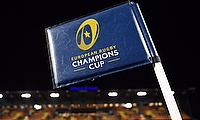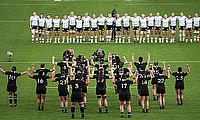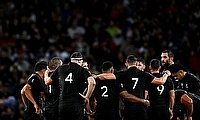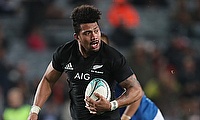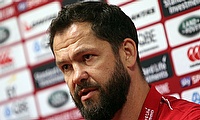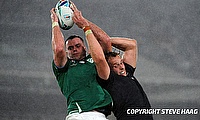Ireland can be the thorn in New Zealand's side
The first four weeks of The Rugby Championship have been bitter pills for Australian, South African and Argentinean rugby fans to swallow.
The All Blacks wrapped up the Championship with two games to spare, comfortably seeing off the best that the Wallabies, Springboks and Pumas could throw at them. They are now faced with two of their more challenging fixtures, trips to take on Argentina and South Africa on foreign soil, but New Zealand’s place at the top of the rugby world order has been firmly reemphasised over the last two months.
As for those watching from afar, in the northern hemisphere, the objective has been made clear by the proceedings to date. The task is no longer to bridge the gap with the southern hemisphere, it is solely to bridge the gap with New Zealand. Anything less than that would mean settling for second best and that should not be the mindset of any Tier One rugby nation.
Unfortunately, a quirk of scheduling means that England, the number two team in the world and a side that is currently enjoying a 10-match win streak, will not face New Zealand this year. England will welcome South Africa, Argentina, Fiji and Australia to Twickenham, whilst New Zealand will face off with Ireland (twice), Italy and France.
The whole rugby world seems split. Half seem to think that the All Blacks are untouchable, that no current side in test rugby can get anywhere close to them, whilst the other half think that England have a shot at least, particularly if that game takes place at Twickenham.
Because of the schedule, the prognosticating and the predictions are nothing more than hypothetical, but there is a team preparing to face the All Blacks, that no one is talking about, that could upset Steve Hansen’s apple cart.
That team is Ireland.
Joe Schmidt’s men followed up a disappointing Six Nations with a hard to define tour of South Africa earlier this year. The men in green (and not gold) were significantly understrength and yet still managed to win their first ever game in South Africa. They then proceeded to lose the next two tests and fall to a series defeat.
Usually they could take succour from the fact they won a game with a number of key players missing, but expectations, both inside and outside the Irish camp, rose during that tour and the series has to ultimately be seen as a disappointment.
Now, with New Zealand looming, Ireland are welcoming back key injured players, looking solid - Connacht aside - in the Guinness Pro12 and actually match-up pretty well with their All Black adversaries.
The Rugby Championship has provided all the scouting intelligence and analysis of the All Blacks that Ireland could possibly want and whilst the scorelines of the games seem to suggest otherwise, New Zealand are not invincible.
The Kiwis can be countered but it will take phenomenal defensive line speed, immaculate tactical kicking and players capable of dominating the contact area.
Defence coach Andy Farrell is a welcome ace up Schmidt’s sleeve, with the Englishman having orchestrated the defence of England in 2012 that not only nullified New Zealand’s attacking ability, but also allowed England to turn defence into attack.
The line speed of the likes of Brad Barritt, Courtney Lawes and Owen Farrell was superb that day and that’s what Ireland will need from their pack and back line alike if they are to do something similar. The duo of Iain Henderson and Ultan Dillane in the engine room would be a start towards that goal, as would including players such as Josh van der Flier and Robbie Henshaw. Whether or not Ireland can get the same speed and reliable tackling from their chosen fly-half as Farrell provided that day is questionable, however.
Going for two such dynamic second rows as Henderson and Dillane has its set-piece risks but only England, out of New Zealand’s last three losses, had the set-piece advantage over the Kiwis. Both South Africa and Australia have been able to beat the All Blacks with less efficient lineouts.
In terms of tactical kicking, Ireland may be best-suited of any nation to stop New Zealand.
Conor Murray, when on form, is second only to Aaron Smith in this facet and is measured enough in his box kicking to allow the aerially adept Irish back line a good shot at winning the duel. Schmidt knows this is a key part of any test match and fills his back line with players capable of challenging and winning the ball in the air as a result.
If Ireland can couple an in-form Murray, who has looked solid in the start to the Pro12 season, with a good kick chase, well-honed exit strategies and a fit Jonathan Sexton at fly-half, they will have as good a chance as any of negating the All Blacks’ formidable kicking game.
One constant in the three losses New Zealand have suffered over the last four years is that they lost the battle at the breakdown.
England had 94.1% ruck success in 2012, with both teams conceding 12 turnovers apiece, whilst South Africa had 95% ruck success in 2014, conceding six less turnovers than New Zealand. Australia, with the ever-impressive David Pocock in tow, recording a dizzying 99% success rate at rucks. In all three games, New Zealand had a lower success rate at the contact area.
The question is, can Ireland replicate that feat?
The breakdown battle goes well beyond the back rows but ultimately the loose forwards tend to play pivotal roles in its outcome, such are their skill sets, and that will heap pressure on the likes of CJ Stander and Jordi Murphy. To maximise the players Ireland have available who are extremely skilled at both rucking and counter-rucking, Stander could be moved to eight, sacrificing Jamie Heaslip to a bench role, and allowing for two savvy breakdown operators at six and seven.
Murphy performed well in South Africa this summer and could be one choice, whilst the other spot would be hotly contested by van der Flier, Rhys Ruddock, Jack O’Donoghue and potentially Peter O’Mahony or Sean O’Brien if they can prove their fitness in time. With the added mobility an engine room of Henderson and Dillane would bring, Ireland are potentially a match for New Zealand on the deck.
One thing that will certainly help Ireland in this goal is that they get two cracks at the All Blacks this autumn. They meet first at Soldier Field in Chicago, before locking horns again two weeks later in Dublin.
Ireland probably aren’t in as good a position to unseat the New Zealand as England are currently, but with Italy and France the only two other European opponents the All Blacks will take on this year, Ireland are the northern hemisphere’s greatest hope for taking the scalp of New Zealand this season.

